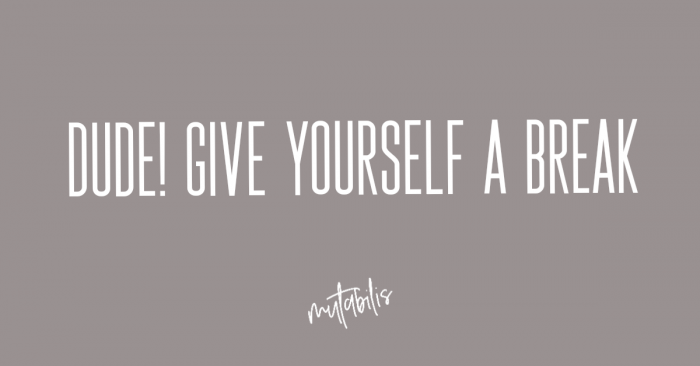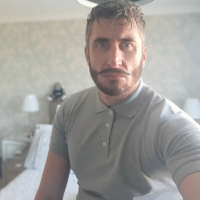I haven’t ever grappled with torture and anguish caused by questioning the love between my parents and me. The love between us is unconditional, of that I am sure.
Of course, there was a talk about me being a boy that liked boys. It was awkward in the way that we all recoil from discussions of an intimate nature with the parents – it’s a bit weird. I am forever grateful for the way my parents handled the situation.
My dad has a half cockney, half Mancunian affectation, which I am sure is unique to him – all no-nonsense and logical but with the musicality of a London cabbie on an airport fare.
I was struggling to make eye contact, so he put himself directly in my line of sight and asked, “Are you happy?”, as we locked eyes the tears that I could feel swelling behind my lower eyelids were visible in his. I nodded meekly, causing salty pearls to tumble down my face soundlessly, each one a vacuum of dense, inscrutable emotion.
“You’re my son. If you’re happy, I’m happy.”
I was impressed when he shrugged and adjusted his posture without shedding a tear. Having made sense of things in his mind, and signalling that he knew all he needed to know he about-turned and made his way over to the local pub.
The front door opened, and we all heard, “Well, I guess I ended up with three daughters, after all!”. I am a middle child, and five years in each direction of my age, I have a fiercely protective and unique sister.
We all laughed, then the door closed, gently.
On the Manchester council estates in the year 2000, and especially in our house, phobias were more straightforward than they are now. We feared spiders, car robbers and the methadone queue on a Thursday at the Health Centre which snaked, disturbingly, along the length of the Infant School Playground.
Phobias relating to people just wasn’t a part of my growing up. We knew which characters to avoid, and the specific points where one estate became another. I understood from a very early age that people operate in groups, but the people that make up one group are no different from those in another.
Looking back, it explains what I have almost no interest in identity; I only know how to be me. So that’s who I am.
Nobody judged me when I got my first boyfriend, a man thirty years my senior. There were no raised eyebrows a year later when the second boyfriend, a straight man with two children, appeared. Then came my third boyfriend, a wannabe DJ from Blackpool.
It was from him that I contracted HIV.
I sat on the dining table and made my Mum turn her back to me whilst I told her the diagnosis. The slightest wobble preceded squaring of the shoulders then my mother turned and said, “So what do we do now?”.
There were a few raised eyebrows when I brought home boyfriend number four—a trainee teacher from Bolton, and Indian. I would be on boyfriend number four for the next ten wonderfully discombobulating years. This man was the closest anyone in my entire family had gotten to a degree; it still feels like a cruel irony that my childhood home shares a street with the University of Manchester.
I moved from Manchester to London, loved by my family and with a partner that expanded my world view, I broke the cycle of benefits and scams and cleared my path out of the estates.
The love that boyfriend number four and I had was a movie kind of love. We scaffolded one another perfectly, never being a crutch or restraint, only unwavering support. His crooked smile made my heart beat a tiny bit faster. The way he sat on his haunches with a cup of tea with his t-shirt pulled over his knees made me think of the mischievous monkeys that I had seen at a temple in Bali, he still did this years later as a school leader.
He wasn’t my world, and I wasn’t his. We lived in a world made by us, about us and for us, and we had no idea that we had done it – it certainly wasn’t intentional.
The testimony from Joni Mitchell, “Don’t it always seem to go that you don’t know what you’ve got ’til it’s gone” is way more than her ruminating, it is a universal and inescapable prophecy.
The skinny lad brought up in poverty on a council estate had made it to thirty-three-years-old and was out of the estates. Living in London and running a business, maintaining a long term [gay] relationship, mortgaged a house and had just gotten his second dog, Latté, as a companion for his first dog, Chai.
I felt safe. It freaked me the fuck out; living on the adrenaline of survival was my default setting.
I started doing drugs. At first, it was party drugs in the clubs and infrequent, usually restricted to Bank Holiday weekends. With the clubs came the clubbers, who all seem to have magnificently sculpted bodies, so it wasn’t long before I was taking steroids and spending more time in gyms – exposed to even more magnificently sculpted bodies.
The infrequent drug use became frequent, and the steroid doses got higher and more potent. These toxins that I had introduced into our world were dangerous, though not in comparison to the insidious insecurity, deception and disrespect that dwarfed the scaffolding, aspiration and conviction forming the foundation of our relationship.
Within six months, I became homeless, unemployed, destitute and utterly alone. I was also addicted to drugs, but I didn’t know that yet.
Getting to thirty-three years of age without experiencing what it is to be ashamed is an incredible gift, and I am glad that I got to have such a massive chunk of untainted life.
The need to survive in my childhood meant that presenting as functional was not an issue. I held positions of leadership in sales, and I managed to make some money. Interaction with colleagues came quickly to me. I never failed to take my dogs for their walks.
I’m a northern lad when all is said and done, and it’s tough to abandon childhood adages such as there’s no point crying over spilt milk, you’ve made your bed so lie in it, and mad fer’ it!
It was only in being alone that I would allow the mask to fall. I didn’t speak to my parents for a full year, though it was unintentional.
I’m not entirely sure how it happened, but after a year-long spiral of drugs and parties, I met boyfriend number five – the current reigning. It was only in the formation of a new relationship that I understood the immensity of the destruction that lay in my wake. It was a painful lesson to learn.
In recovery, the trope of “You’ve got to hit rock bottom before you can get better” is as useless as it is grating. The notion of ‘rock bottom’ is as impossible to determine as ‘breaking point’ because [when dealing with behaviours] they can only be identified after the fact.
I had been seeing sketchy people and doing drug deals for years by the time May 2019 came around, so when a drug dealer invited me into his house, I didn’t think twice.
I would get out again five days later. It was five days of repeated injections of unknown drugs that would keep me in a drug-induced trance-like state. It was weeks later that some memories of those five days surfaced, including the memory of the drug dealer letting multiple men use my anaesthetised body for their sexual gratification, for a fee.
I also had to give the drug dealer the contents of my bank accounts to pay for the drugs that he had used to sedate me.
As a result of the trauma and drug use, I experienced a state of psychosis, which is a literal break from reality. My world shattered.
I called my Mum as soon as I got into my house and told her everything, the drug use, the steroids, the shame, and of course the five days that I had just endured. At six in the morning on Tuesday after a Bank Holiday weekend, my mother took a call from her manic son, and she uttered the following sentence:
“Well we need to get you better then don’t we.”
The overwhelming feeling that I had let my Mum down, embarrassed her, disgraced the family, ruined my life and all the other countless horrible things that the brain conjures when it is in a freefalling spiral are the wall between you and your champion.
The very fact that my Mum was the last person I wanted in my corner, knowing all my secrets is what makes her the person I need in my corner! Work out who you feel you’ve let down most, they’re probably you’re champion.
Sometimes it’s yourself, and you are always enough!
I live with Post Traumatic Stress Disorder, Depression, Obsessive-Compulsive Disorder, Social Anxiety and Agoraphobia. Of course, these are all in addition to my drug addiction.
On any given day, at any given moment, we don’t know everything that we are going to learn in our entire lives. Nobody has all the answers, and that’s okay – the world will continue to spin regardless.
I believe that there are very few people that intentionally set out to sabotage their life, but life is kind of like Craps and despite all protests to the contrary every single one of us is rolling the dice.
The point of me telling this abridged version of my life story is to demonstrate that I take responsibility for the choices that I have made at every stage of my life. A lot of them were terrible choices, and hindsight is a beautiful thing. I wouldn’t go as far as saying I am confident of the consideration of all my available options, but I do know for sure that I did not want to end up here.
The patriarchal culture that we ascribe to is problematic in lots of ways; not the least of those problems is the expectation of males in society and the associated demonstrations of masculinity.
We have got to give men a break, we have got to give ourselves a break, and we have to go instruct men to take a break in the event of rejection of the first two options.
I may be the first Lancashire man to do this, ever, but here goes:
There’s no use crying over spilt milk – Feelings are like burps and farts; they are better out than in – more often than not, you need a listener and not a helper.
You’ve made your bed now lie in it – You can course-correct at any point, if the bed isn’t comfy, create a new one. You’re in charge of every aspect of your reality, and you’re responsible for it too.
Mad fer’ it! – In spite, or maybe because of, the challenges of life there’s no denying that, miraculously, we have one so we should be Mad fer’ it!
Give yourself a break; you deserve it!
Every year, one in four of us will experience a mental health problem. But hundreds of thousands of people are still struggling.
Mind will listen, give you support and advice, and fight your corner.
Prevention is at the heart of what the Mental Health Foundation does, and they have a section of their website dedicated to Men.
Men’s Minds Matter is a resource hub led by Dr Luke Sullivan, who is a Crisis Team Psychologist and Suicide Prevention Specialist.











Read 1 comment and reply